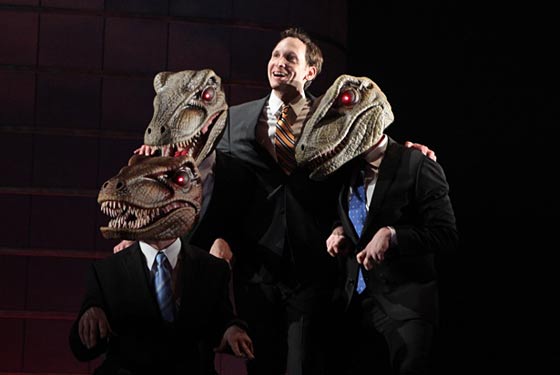
Unlike the company whose storied fall it chronicles, Enron clearly telegraphs its intention to defraud the consumer: “When we tell you [this] story, you should know it could never be exactly what happened. But we’re gonna put it together and sell it to you as the truth.” This proviso is delivered by a lawyer, who adds: “I could tell you how the world works, but I don’t have the time, and you don’t have the money.” That gets broad laughs—and broad laughs are what’s for sale here. Subtlety is not a commodity that Lucy Prebble’s fast, flashy, feckless Epcot ride of a play is trading in: If twelve-gauge potshots at the likes of Schwarzenegger and Lehman Brothers are your taste, you won’t be disappointed.
But Enron aspires to be more than a shiny shell. It wants to earn your trust, your respect, and your rapt attention to an infamous but still poorly understood scandal: the total implosion of a “New Economy” energy giant whose name became a byword for greed and mismanagement. (Now, of course, we have plenty of those.) Prebble, who wrote The Sugar Syndrome and created the Showtime series The Secret Diary of a Call Girl, and director Rupert Goold (coming off 2008’s rip-roaring Patrick Stewart–centered Macbeth) aim to stage a spectacle massive enough to fill the Texas-sized crater Enron left in the financial landscape. They want to explain, in prop-comedy semaphore, a rococo fraud that mere numbers can’t convey. At the same time, the playmakers seek to craft an honest, human-size drama about a supremely intelligent, supremely angry man—Enron president Jeffrey Skilling (the always-entertaining Norbert Leo Butz): Here’s a guy who used his free-market convictions and his faith in the Big Idea as poker chips, bet them against a stochastic universe, and lost, big-time, taking a lot of American lives down with him. He was out to commodify bandwidth, weather, the very air we breathe—and for our own good, too, or so he claimed. Sounds like an interesting fellow. But this story isn’t about him. Deep in its neon bowels, the show knows it can’t have everything. So it chooses spectacle over humanity, and the results are good, dumb fun—though little more than that. Enron never quite rises from hi-tech clown show to the heights of empyrean absurdity its subject deserves.
That said, it’s one hell of a hi-tech clown show. The production design—glass towers, forests of filing cabinets, and flat-screens against a black void—meets at the corner of Houston and Tron, and owes a great deal to Enron’s own vitreous sci-fi aesthetic (as well as the look and feel of the excellent documentary Enron: The Smartest Guys in the Room). A phalanx of choreographed lightsabers—sizzling in a near-total stage blackout—swing en masse as Enron carves up the California power market, blacking out the state. Treacherous, debt-devouring financial constructs called “Raptors” come to life, in thrillingly literal form. Fun stuff—if a bit denatured. At one point, Skilling boasts that he’ll “make Wall Street look like Sesame Street.” Enron’s cartoon pedagogy makes good on that boast.
The human characters are as reduced as the financial concepts: Copenhagen this ain’t. Butz’s Skilling is your classic aggrieved, bulked-up former nerd, despising ineptitude and pledging to run the company “on Darwinian principles.” He’s first and foremost a man on the make, and later, a man in over his head, but there’s not much to read in between those front and back flaps. (Butz has charisma, but his Skilling is 90 percent perspiration: Where’s the Svengali who sold Wall Street a mirage for over a decade?) His emotional transactions are written in the same schematic docudrama style as the rest of the show. His odd relationship with Enron founder Kenneth Lay (24’s Gregory Itzin), here played as a dull-witted, see-no-evil good ol’ boy, never really snaps into focus. His fraught partnership with Fastow, which proves his undoing, gets upstaged by the aforementioned dinosaurs (for whom, oddly, the viewer feels more sympathy than for the humans onstage). And his adversarial, sexually charged contretemps with division head and unlikely moral compass Claudia Roe (Marin Mazzie) feels like what it is: a writer’s strenuous invention. (Roe is a composite, mostly cloned, it would seem, from Rebecca Mark “the Shark,” a vice-chair of Enron who cashed out with $80 million in 2000.)
Skilling’s alone up there. He exists in a bubble—which is at once the play’s best and least-developed theme. “Everything I’ve ever done in my life worth anything has been done in a bubble; in a state of extreme hope and trust and stupidity,” thunders our hero, basically equating American foolishness with American genius. One wishes Enron had done more to exploit that curious little notional micro-economy. But maybe it was too risky a market for a show that consistently shorts the Big Idea when there’s a quick joke to be cashed.
Spring Rush
The last seven Tony contenders storm Broadway.
• Fences
• Everyday Rapture
• Promises, Promises
• Enron
• La Cage Aux Folles
• Collected Stories
• American Idiot